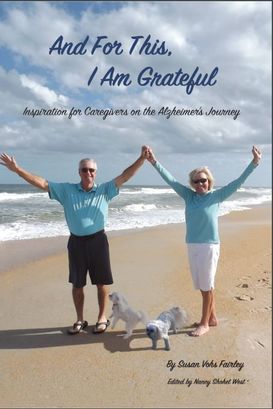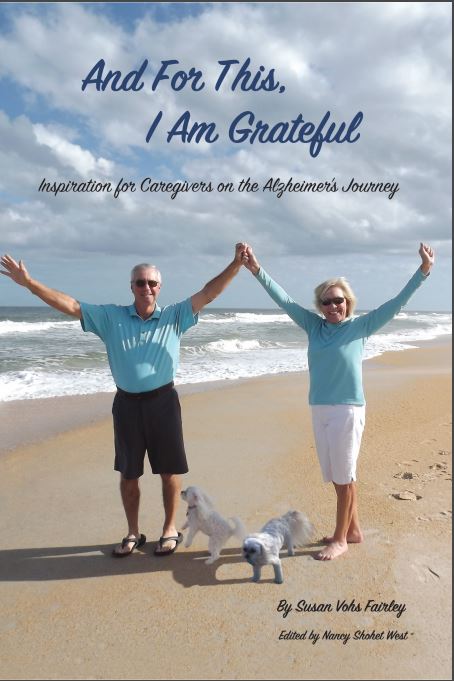
Judy’s husband had Alzheimer’s, and although he had moved into a residential care center not long after I finished his memoir, Judy continued to attend a support group for caregivers of people with Alzheimer’s.
This time, she wanted to know if I could work with the leader of her Alzheimer’s support group. Not on a memoir, exactly: more of a compilation. Every Sunday morning, I learned, the group leader, whose name is Susan, sends out an inspirational essay to all the members of her support group and to an ever-widening network of contacts who have received the emails from friends and asked to be added to the list even if they aren’t geographically close enough to attend the group. Susan, who cared for her mother with Alzheimer’s for four years and started the group after her mother died, fills her weekly essays with encouragement, praise, and appreciation for her fellow caregivers. She uses her essays to remind her group members constantly of how hard they are working and how much she recognizes their unflagging efforts – even if the spouses or parents for whom they are providing care don’t always recognize it. She reminds them to take care of themselves, as well.
And she fills her essays with engaging metaphors and anecdotes: stories about everything from enduring a Florida coastal hurricane to cheering on her hometown Atlanta Falcons in the Super Bowl, finding ways to connect each anecdote in some way to the journey of a caregiver. She shares recollections of her mother’s final years – the delight her mother took in spotting a turtle on the front lawn or going out for fried shrimp – and frequently pays tribute to her husband Gary, steadfastly by her side during the years she took care of her mother.
And Susan brought in another element of her own life as well – her struggle with cancer. Though she had been diagnosed and treated a few years earlier, a recent recurrence was looking ominous, which was what had inspired her friend Judy to contact me about a book. Susan began undergoing a rigorous round of chemotherapy and related treatment, a process that exhausted her and sometimes dampened her spirits.
Yet on Sunday mornings, she still manages to produce an essay for her followers, every single week. Facing cancer has, in fact, brought still more perspective to her understanding of the work of caregivers. Now she knows more than ever the importance of resting, napping, and clearing one’s mind – practices she’s urged her group members to observe for years. And the now-frequent need to rely on her own caregiver, her husband Gary, is demonstrating to her that sometimes caregivers learn what it’s like to be on the receiving end of the caregiver’s journey.
Judy, Susan, and another group member worked together to dig up two years’ worth of weekly essays and email them to me. They wanted the project turned around quickly, so it was agreed that I wouldn’t do any editing beyond very basic copy-editing; Susan’s essays would be left just as she had written them. The women began sending me photos for the book as well: of each other, of their group members, of their yearly Walk to End Alzheimer’s fundraising event, and also of the Florida landscapes they all loved, so that sunsets and ocean waves and palm trees and pelicans and full moons would populate the book’s pages.
I asked if it would be possible for me to interview Susan in order to write an introduction explaining the context of the book. When we first discussed it, Susan was in the midst of a round of chemotherapy and didn’t feel well enough to talk on the phone. But in the weeks that followed, she became a little bit stronger. Not only was I eventually able to interview her for the introduction but she even supplemented my introduction with a “Dear Caregivers” letter for the front of the book that she wrote herself.
For the front cover, Susan supplied a gorgeous photo of herself and her husband walking on the Florida beach with their two beloved Maltipoo pups at their feet.
When Susan saw the completed book, she was amazed. “I cannot believe I am holding a copy of a book with my name and picture on it!,” she emailed to me when it arrived in her mailbox.
Susan’s group members, friends, and email list were thrilled to have her essays compiled into one book. Susan was surprised and touched by their enthusiasm. “This will help her through her own challenges that lie ahead,” one of her friends told me.
I agree. She still has a long haul to get through with her own treatments, and probably a lot of medical decisions to face. But now she also has her book: a lasting legacy of her important and meaningful words – plus photos and even some testimonials from her many fans about how much the group has meant to them. Susan’s legacy lies in the hearts of her friends and followers – but now also in the pages of a book. What a privilege for me to get to be part of this process.

 RSS Feed
RSS Feed